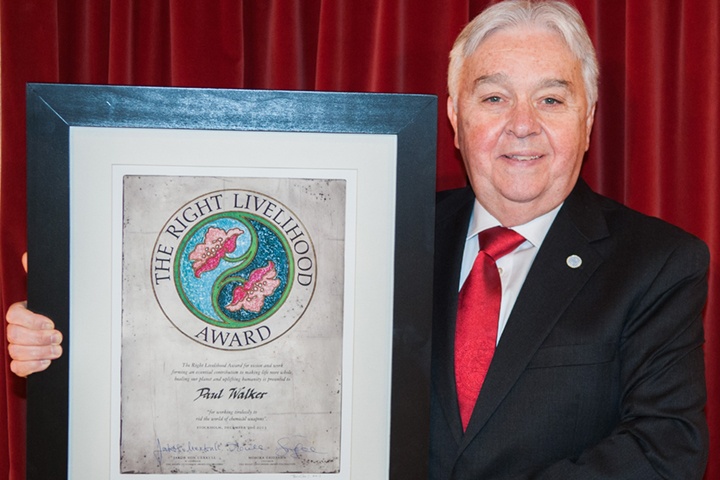World without a trace: Paul Walker works to eradicate chemical weapons

Dr. Paul Walker (PhD '78) received the 2013 Right Livelihood Award in Stockholm.
Photo Courtesy of Green Cross International
Few people know exactly what they want to accomplish when they set out in the world. Fewer still adhere steadfastly to their path until they succeed, particularly when the goal involves modifying government activity on the world stage. But that’s exactly what Paul Walker Ph.D. ’78 has done.
Walker recognized that the world is a dangerous place. His goal: to make it safer by influencing U.S. policy to mitigate, if not eliminate, the damage inflicted by war, munitions and weapons of mass destruction.
“I was committed to working in some part of national politics that would leave a better world for our children — a cleaner, less dangerous world,” Walker said.
In December, he was honored with the Right Livelihood Award, called the alternative Nobel Prize, for his work eradicating chemical weapons. He received the award at a ceremony in Stockholm a week before traveling to Oslo, at the invitation of the Organization for the Prohibition of Chemical Weapons (OPCW), to see OPCW awarded the Nobel Peace Prize.
“I was really pleased and surprised by the Right Livelihood Award, because a lot of the work we’ve done over the years has really not been recognized,” said Walker, who has helped eliminate more than 58,000 tons of chemical weapons in eight countries. “It was a welcome breakthrough, and even more so when OPCW got the Nobel Peace Prize.”
Walker has worked closely with OPCW, established to carry out the work of the Chemical Weapons Convention arms control treaty of 1993, in facilitating the safe demilitarization of chemical weapons stockpiles in Albania, India, Iraq, Libya, Russia, South Korea, the United States and now Syria.
He did this first as a professional staff member of the U.S. House Armed Services Committee, and since 1995, as international director of the Environmental Security and Sustainability program of Green Cross International— an organization founded by Mikhail Gorbachev after the 1992 Earth Summit in Rio de Janeiro. Gorbachev personally asked Walker to take on the leadership role.
Walker was drafted into the U.S. Army during the Vietnam War after his first semester of graduate studies at the Johns Hopkins School for Advanced International Studies. He trained in the Russian language at the Presidio of Monterey, Calif., then spent two years working for the U.S. Army Security Agency in Germany as an interceptor and translator of Russian/East German intelligence, before completing his master’s degree at Johns Hopkins.
A self-proclaimed child of the Vietnam War, he entered MIT’s political science doctoral program in 1973 as a Vietnam-era veteran determined to modify United States “aggression abroad” and interventionism, he said. He chose MIT because it offered an excellent opportunity to study what he calls “bombs and bullets” or weapons systems funding and military policy.
“MIT had an excellent faculty for that, strong in military affairs,” Walker said. Indeed, Walker’s faculty advisor, the late William Kaufmann, was advisor to seven U.S. secretaries of defense. While Kaufmann didn’t share all Walker’s opinions about U.S. policy, he “appreciated my curiosity and irreverence for traditional assumptions,” said Walker.
Walker wasn’t alone in his approach. Among the members of the incoming doctoral Class of 1973 were other military veterans and activists from the arms control community who were critical of the war and of U.S. and Soviet policies. “We came in as an inquisitive class really wanting to make a difference, wanting more than to work for the beltway bandits in the D.C. area,” said Walker.
For his thesis on the SALT arms control treaties, he interviewed 120 people who had been involved in the negotiations, including Henry Kissinger. He went on to serve as senior advisor to the chair of the House Armed Services Committee, and helped pass the 1992 Nunn-Lugar bill to destroy weapons of mass destruction in the former Soviet Union. A few years later, he helped draft language for the Assembled Chemical Weapons Assessment Program, which encouraged alternative technologies for the neutralization and destruction of U.S. chemical weapons.
More recently, Walker and the OPCW have overseen removal of 92 percent of Syria’s chemical weapons.
Today, more than 80 percent of the world’s declared chemical weapons have been destroyed, with plans either in place or in the making for the destruction of the remaining stockpiles of Iraq, Libya, Russia, Syria and the United States .
Walker deserves much of the credit for these remarkable accomplishments. He has remained true to his calling by facilitating elimination of the bulk of the world’s chemical weapons, and securing a safer future.